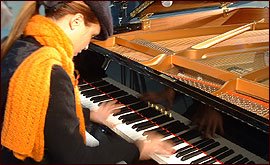Sasha falls, young and fair
 I was able to believe when everything looked a little dark and gray.
I was able to believe when everything looked a little dark and gray.Here are two of the best articles that appeared as people were taking in what had happened. The first also appears on Sasha Cohen's own site.
After Falling, She Rises And Shines
By Sally Jenkins, Washington Post, Friday, February 24, 2006
TURIN, Italy
There was no way to prettify it. Everyone fell. On such a night, when the Olympic gold medal in figure skating went to practically the only woman left standing, it seemed right that silver was awarded to the one who did the best job of getting back up again.
...
Cohen fell in warmups. She fell on her first triple jump of the night, a lutz, when she lost her balance and landed on the back of her exquisite little red dress. And then she almost fell again, on a triple flip, when she staggered and put both hands on the ice. But somehow Cohen managed to steady herself on that ice, so scarred with skid marks, and stayed upright.

From that moment on, she began counterpunching. The triples began landing cleanly, like uppercuts. Triple loop. Triple flip. Triple toe. And then two more triple salchows. Five triple jumps in all, before she ended her four-minute free program, and skated to the sideboard where she mouthed something to her coach, John Nicks, that looked like, "I tried."
No one would land more triples among the final group of contenders. Not Arakawa, and not the bronze medalist Irina Slutskaya of Russia, who fell hard on her own triple flip, and also skipped other planned jumps.
"I was able to take one step at a time. I was able to believe when everything looked a little dark and gray," Cohen said.
The fact that skaters wear mock evening gowns makes it hard to appreciate what Cohen did. Maybe if her knees were bloody. Maybe if she wasn't such a royal figure in her garnet and gold dress, and maybe if the score of "Romeo and Juliet" hadn't been playing while she was working, it would be easier to convey the grit of her performance. Think of it this way: How often does a quarterback throw two interceptions in the first quarter but come back to throw three touchdowns and make the playoffs? What Cohen did was something similar.
...

Cohen falls down, doesn't melt down
By Ron Judd, Seattle Times staff columnist
TURIN, Italy — Figure skating is a cold business, and if you let it, the chill can run right to the bone.
How cold? This cold:
Thursday night in Turin, in what could have and should have been the dramatic highlight of the XXth Winter Olympics, American ice princess Sasha Cohen skated onto the ice, sailed into her first jump, a triple lutz — and landed flat on her backside.
And in the stands at the Palavela, an entire section of fans stood up and cheered wildly, waving Russian flags. They jumped and hooted, delighting in Cohen's misfortune because they believed it would push their own skater, Irina Slutskaya, to the top of the medal stand, completing an unprecedented gold-medal sweep in figure skating for the Russians.
Their celebration continued when Cohen, 21, made her way to the opposite end of the rink and tried another jump, a triple flip, and slid out of it, reaching down with both hands to save herself from a fall.
All this happy back-slapping continued as Cohen, rattled by her inability to land triple jumps in her warmup, struggled to pull herself back together on the ice.
The Russians had read the same script as everybody else: Cohen lays down a short program as delicate and perfect as a summer wildflower, then goes out for the free skate and creates skunk cabbage.
It looked that way. Felt that way. Hurt that way.
Except two things have changed since the last time Cohen blew apart before the world's eyes. She grew up, learning not to let a hole in the ship turn into a full-fledged sinking. And the rules of her own game changed.
Both came into play over the next three minutes, as Cohen struggled to get back into something of a rhythm.
She landed a triple loop. Survived her combination spin. Stuck a triple flip and added a double to it for good measure. Got to a place where, she said, "the music carried me through."
The rest of her free skate was not vintage Cohen — the Sasha of the short program — but her footwork was solid, her spirals superior.
"I just took it one step at a time," she said. "I was able to believe when everything was dark and gray."
Believing translated into scoring in the judges' box, where skaters now are awarded points for everything they do — including the rotations of that botched triple flip, even though it wasn't landed cleanly.
...
Undeserved? Not really, Cohen said.
"Ultimately, a medal just signifies what you've accomplished," she said.
...
"Over the past four years I've changed as a person, because my focus is not on the medal," she said. "For me, it's the experience and the process."
She's been unleashing that cliché for months. But here, once and for all, you saw that she meant it. Saddled with sore legs, a painful groin muscle, chronic back problems and an aching ankle, she missed her Wednesday practice and received ultrasound treatment and gulped down painkillers before skating. But Cohen offered none of it as an excuse.
...
She said she lives and skates now for those perfect, fleeting moments — not when the medals are handed out, but when the whole world stops spinning long enough to watch a figure skater mix grace and power the way only they can do. It is an instant, she explains, when skating "goes beyond an athletic event, and becomes an emotional experience."
...






